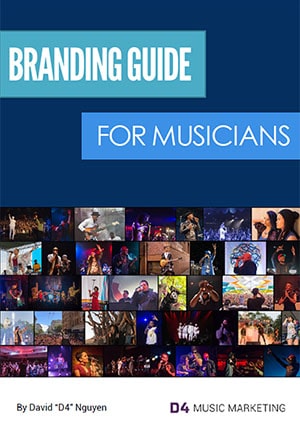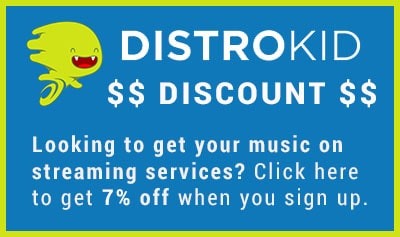
Are you unclear about what marketing is and why you need it for your music?
Marketing, just like branding, is a fundamental component of business, so it’s vital that indie musicians do not dismiss marketing as something only big businesses or major artists need.
If you want to make a living as an artist or musician, you need to treat your music like a business. As with any type of business, you need to have a product or service to sell and customers to buy it. In this case, the product or service is your music, and marketing comes into play to help you find the right customers to buy your product.
When you Google the definition of marketing, here’s what you’ll most likely see first:
The action or business of promoting and selling products or services, including market research and advertising.
The American Marketing Association (AMA) defines it as:
Marketing is the activity, set of institutions, and processes for creating, communicating, delivering, and exchanging offerings that have value for customers, clients, partners, and society at large.
The following sections below will help to breakdown my definition of marketing for musicians. My goal was to really simplify what marketing is to make it easy to grasp so there may be more technical details that are left out.
The 3 Key Elements of Marketing
The way I like to breakdown the concept of marketing is into 3 key elements:
- Knowing what value you provide
- Establishing and communicating what makes you special/ unique (also known as branding)
- Identifying the target audience who will most likely find what you offer as valuable
Successful marketing occurs when all 3 of these elements are in alignment in one cohesive strategy. It is important to understand how these 3 elements interact and depend on each other.
The Importance of Value
When it comes to understanding marketing, the keyword that stands out the most to me is value. Since value is subjective, there is going to be a specific group of people or demographic who will find your product more valuable, while there are others who will not. The group who does see your value is the market you want to reach, hence the word marketing.
For example, the value and brand receptiveness of a Gospel singer is not perceived the same to Christians as it is to Atheists. In other words, marketing requires you to choose a “market” or segment of the population you want to connect with by providing value, which should turn away those who don’t find what you offer as valuable. This is important because you can’t market to “everyone,” which is a common misconception when musicians are asked who they ideally want to reach.
As a note, when I use the word value, I’m talking about it in broad terms. Value, as it pertains to a musician, could reference a number of things like:
- Talent
- Personality
- Brand
- Your story
- How inspiring you are
- How well people relate to you
- The quality of your music
- How entertaining you are
Even though marketing is all about proving, communicating and providing your value, it’s not about talking about yourself. Marketing is about helping the customer realize what’s in it for them – how your music is valuable and meets their wants or needs. Customers, like your fans, view things from their narrative so you need to know how you fit into their story. To fruitfully market your music, you have to have a comprehensive understanding of the subjective value you can deliver and how the listener benefits from it. This is why understanding your product and how your product is perceived is crucial marketing when marketing it.
Know Your Audience
Marketing requires you to identify a segment of the population to market to. The better you know your audience or market, the more efficiently you can reach them. It’s about creating value that is relevant to your target audience.
Effective marketing requires that you identify the many characteristics of who your target audience is so that you can market to them and avoid those who are uninterested. When many musicians are asked who they want to market to, they respond “everyone”. Not only is it not feasible, but it is also very costly to try to market to everyone, which is why marketing requires you to choose a market or segment of the population and steer your marketing efforts to appeal to that targeted group of people.
Your target market is the group of people that should always be at the forefront of your mind before making major business decisions. Musicians who aim at a small, defined target market are far more likely to reach them.
If you need more help, check out this blog on how to find your target audience.
How Branding Relates to Marketing
While we are here, let’s quickly touch on branding and how it relates to marketing.
Branding is what makes the value you offer as a musician unique. It is what makes your target audience want to listen to your music and possibly become a long-term fan.
As an artist, your brand is why people listen to your music, see your live performances and buy your merch. It is what separates you from other musicians. Theoretically, without your brand, your music is just noise.
It’s easy to understand how important branding is in the marketing process, but much more difficult to establish a successful branding strategy. Often times, musicians don’t take advantage of branding due to some misconceptions they may have about it.
How Marketing is Done
There are a lot of ways you can go about marketing yourself as a musician – both online and in person. The effectiveness of your marketing efforts is based on how well you manage to engage your target audience. I won’t go in-depth, as that is an extensive topic, but here are just some general ways to look at how to market your music.
You can stand on the street and solicit your music to random passerby to solicit people to listen and buy your music. But ask yourself, is this really going to be effective to reach your ideal audience? On the other hand, you can pass out your music to people leaving a show or venue that plays similar music to what you offer. That tactic is much more targeted.
Performing at a local bar is a form of marketing, as you are demonstrating your value and your product. The demographics of the audience in the bar are going to influence how effective this form of marketing is. This is why who you associate with and the venues you perform at are important.
On the flip side, you open for an artist that share the same target market. However, let’s say you suck as a live performer. In this case, you have the right audience, but your live performance is not delivering value o your marketing is not going to be effective.
Putting your music on social media is a form of marketing as it allows people to see or hear the value you provide. How you actually go about using social media as a tool is going to determine if you get the results you were looking for. Going around spamming random people on Twitter isn’t going to be effective. Finding online communities related to the type of music you do and building genuine relationships is a more targeted approach.
Conclusion
Hopefully, this helped to clear up what marketing exactly is and why it is necessary for a successful music career. Even as an online marketer, it took me a while to really conceptualize what marketing is and the role it plays in business.
As an artist, you may not like the idea of marketing, but chances are you have probably engaged in some forms of marketing. When all is said and done, communicating your value through marketing will help set you apart from the competition and grow your fan base. Know the impact your music has on other people; it is powerful and touches listeners on an emotional level.
Other Ways of Looking at Marketing
I want to leave you with a few quotes related to marketing from other music marketing professionals that I like:
“Marketing should be a natural extension of the creative process, marketing comes out of your identity. Not separate from your music.”
– Derek Sivers, founder of CDBaby
“Marketing is a strategic form of sharing.”
– Bob Baker
“You have one job as an artist. Use music to change the way people feel.”
– Kim Lajoie







